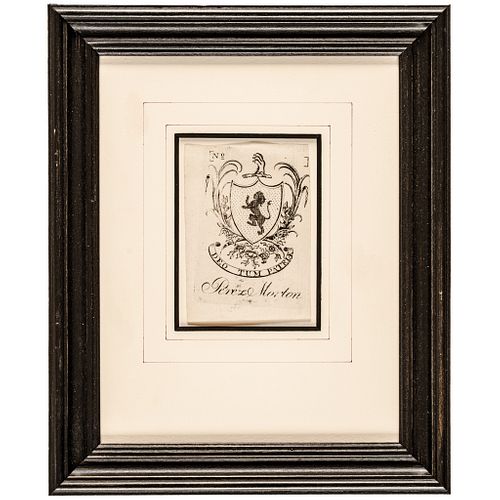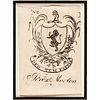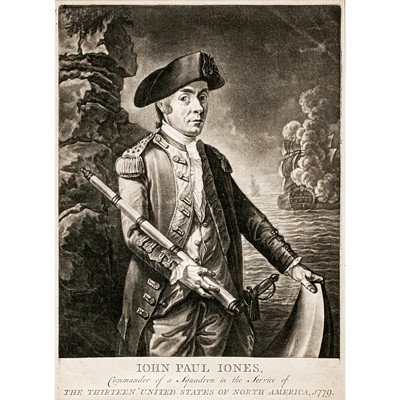PAUL REVERE Engraved Copper-plate Bookplate for Perez Morton
Lot 77
Categories
Estimate:
$1,200 - $1,800
Absentee vs Live bid
Two ways to bid:
- Leave a max absentee bid and the platform will bid on your behalf up to your maximum bid during the live auction.
- Bid live during the auction and your bids will be submitted real-time to the auctioneer.
Bid Increments
| Price | Bid Increment |
|---|---|
| $0 | $10 |
| $200 | $20 |
| $300 | $25 |
| $500 | $50 |
| $1,000 | $100 |
| $2,000 | $200 |
| $3,000 | $250 |
| $5,000 | $500 |
| $10,000 | $1,000 |
| $20,000 | $2,000 |
| $30,000 | $2,500 |
| $50,000 | $5,000 |
| $100,000 | $10,000 |
| $200,000 | $20,000 |
| $300,000 | $25,000 |
| $500,000 | $50,000 |
About Auction
By Early American History Auctions
Jan 23, 2021
Set Reminder
2021-01-23 12:00:00
2021-01-23 12:00:00
America/New_York
Bidsquare
Bidsquare : Early American History Auction of Autographs, Americana, Political & Maps
https://www.bidsquare.com/auctions/early-american-history-auctions/early-american-history-auction-of-autographs-americana-political-maps-6311
311 Lots of Rare, Historic Autographs, Americana, Civil War Era, George Washington, Abraham Lincoln, Slavery & Black History, Revolutionary War Era, Colonial America, Federal Period, War of 1812, Colonial Currency, Indian Peace Medals & more... Early American History Auctions auctions@earlyamerican.com
311 Lots of Rare, Historic Autographs, Americana, Civil War Era, George Washington, Abraham Lincoln, Slavery & Black History, Revolutionary War Era, Colonial America, Federal Period, War of 1812, Colonial Currency, Indian Peace Medals & more... Early American History Auctions auctions@earlyamerican.com
- Lot Description
American Revolution
Paul Revere's Engraved "Perez Morton" Copper-plate Bookplate Committee of Safety Revolutionary War Patriot
(1784) Paul Revere Jr., Engraved Copper-plate Bookplate for American Revolutionary War Patriot, "Perez Morton" (1751-1837), Boston, Framed, Choice Extremely Fine.
This is a choice quality, sharply printed example is one of only 100 printed Paul Revere's metal-cut Bookplate that was Engraved by Revere for the historic Massachusetts Revolutionary War Patriot, Perez Morton in 1784. This Bookplate measures roughly 4" x 2.75" and is well printed in rich black on the correct, white laid period paper. This specimen is printed slightly out of alignment towards the upper right margin. The impression is so sharp that traces of the embossed outline from the original plate remains seen within the paper. There is some very trivial ink smudges from the original printing plate near bottom, as made. It is framed for display under UV-protective glass within a modern black frame measuring to 11" x 8.75". A full illustration of this bookplate and its description can be found in Brigham's reference, "The Engravings of Paul Revere," by the American Antiquarian Society, 1954. An wonderful authentic, fully original historic example of a Paul Revere's Copper-plate Engraved Bookplate for Revolutionary War Patriot "Perez Morton". This is a very choice example displaying excellent eye appeal.
Note: According to Bingham, an entry into Paul Revere's Day Book under the date of July 12, 1784 is entered, "Perez Morton Esqr. Dr. To Engraving your Arms on Copper 18 (Shillings). To Printing 100 Impressions 4-6. (Total) 1-2-6."
Perez Morton (November 13, 1751 - October 14, 1837) was a lawyer and American Revolutionary War era Patriot in Boston, Massachusetts.
Morton was born in Plymouth, Massachusetts in 1751, and raised in Boston. His father, Joseph Morton, worked as a Tavern-keeper at the White Horse Tavern. Perez attended the Boston Latin School starting around 1760, and Harvard College, graduating in 1771. He was admitted to the Massachusetts bar in 1774.
He participated in the Committee of Safety, and the Committee of Correspondence; he was also a Mason, serving as Deputy Grand Master of the Grand Lodge of Massachusetts in 1789-1790. In 1775-1776, he was Deputy Secretary of the Council of the Colony of Massachusetts Bay. On April 8, 1776, Morton spoke at the memorial service held for Joseph Warren, at King's Chapel.
In 1778, he married Sarah Wentworth Apthorp. Together they had 5 children: Sarah Apthorp Morton (1782-1844); Anna Louisa Morton (1783-1843); Frances Wentworth Morton (1785-1831); Charles Ward Apthorp Morton (1786-1809); and Charlotte Morton (1787-1819). From ca.1796 to ca.1803, the Mortons owned a house on Dudley Street in Dorchester; the house may have been designed by Charles Bulfinch. Friends and associates of Morton included James Bowdoin, John Adams, and James Swan.
In 1788, the Mortons were the subject of a public scandal regarding an illegitimate child of Sarah Morton's sister, Fanny Apthorp, rumored to have had an affair with Perez. The scandal was amplified in the press, notably the Massachusetts Centinel and the Herald of Freedom and the Federal Advertiser. A novel published in 1789, The Power of Sympathy, written by a neighbor of the Mortons, William Hill Brown, depicted an adulterous affair between a man and his sister-in-law; at the time, many suspected the novel to be based on the real-life Morton/Apthorp affair.
Morton served as Massachusetts Speaker of the House, 1806-1808, and 1810-1811; and as Massachusetts Attorney General, 1810-1832. He died in Dorchester in 1837.
Portraits of Morton have been made by Charles Balthazar Julien Fvret de Saint-Mmin, and others. Some items owned by Perez Morton are now in the collection of the Museum of Fine Arts, Boston, including a Silver ladle made by Paul Revere.
Morton also wrote the text of the Hymn, "When Jesus Wept," music composed by William Billings.
- Shipping Info
-
Early American provides in-house worldwide shipping. Please contact us directly if you have questions about your specific shipping requirements.
-
- Buyer's Premium



 EUR
EUR CAD
CAD AUD
AUD GBP
GBP MXN
MXN HKD
HKD CNY
CNY MYR
MYR SEK
SEK SGD
SGD CHF
CHF THB
THB












